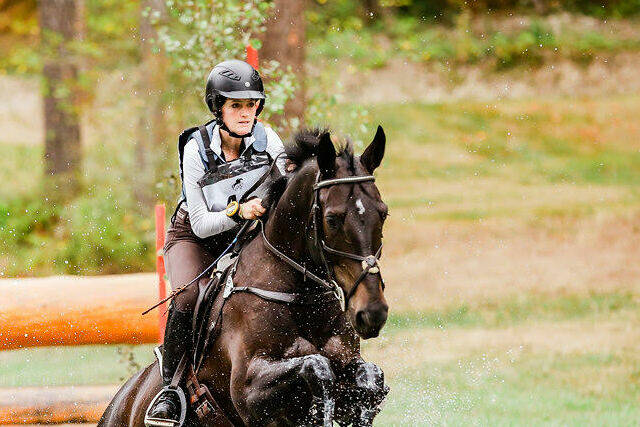Ashleigh Rauen, a seasoned equestrian and long time islander, is set to embark February 2026 on one of the most grueling horse races in the world: the Gaucho Derby in Patagonia, Argentina.
“Am I really gonna do this?” she said with a laugh.
The Gaucho Derby is a 500-kilometer endurance race through the wilderness of Patagonia, a mountainous land of fjords, rainforests, glaciers, deserts and steppes in the southern side of South America, where riders must navigate their way on horseback with the help of topographical maps and a GPS.
Participants are allowed only 20 pounds of gear and must camp along the way with limited supplies, swapping horses multiple times throughout the race which are selected via a randomized “hat draw.”
Riders fly to Argentina and then take a 10-hour bus ride to the race’s starting point near El Calafate, toward the southern end of the country. The course ends with the iconic Mount Fitz Roy in the background.
Hundreds of riders apply to race, but only about 10% of applicants are accepted.
Rauen, who specializes in three-day eventing, will face an entirely new set of challenges when the race starts in February.
“Endurance is a different discipline that I don’t do,” she said. “But I’ve always had a little interest.”
Rauen’s journey to the Gaucho Derby began in her childhood. She grew up immersed in the equestrian world. Her mother, Cici Carson, runs Westside Stables, an island horse training and riding school.
Rauen attended the University of Washington without any intention of pursuing a career with horses.
“After college, I got a horse, and then it was just a slippery slope,” Rauen said.
The 2008 recession led her to work for her mother and reignited her passion for equestrian life.
“Why did I ever stop?” she said, recounting her switch back to equestrian life.
Now, Rauen owns Ride in the Rain LLC, an island horse training school specializing in young horse development. She competes every summer, often heading to championships in September. This year, she placed fourth and tenth in three-day eventing with two different horses.
“I have been doing three-day eventing for exactly 10 years, and I’ve never missed a season,” she said. “I have some really good results … but I thought I would have gotten farther by now.”
Working with horses has been a dream, Rauen said, but at the end of the day, it’s her job and livelihood. The derby offers a chance to step outside her usual routine and take on a new challenge, even if only for 10 days.
“I’m really fortunate that I can call this my job,” she said. “But I think because of all that pressure—that financial pressure … it just inspired me to do something different.”
Training for the Gaucho Derby involves much more than just riding.
Rauen, who rides and trains six horses daily, plans to attend an endurance boot camp in Oregon. The camp is led by a trainer with experience in both the Gaucho and Mongol Derbies and focuses on camping, navigating and riding long distances.
A key part of Rauen’s preparation is assembling a lightweight kit, as riders face a strict 20 pound weight limit to carry their tent, food, water and supplies.
The race organizers also enforce a rule that riders cannot push their horses too hard and expect them to recover quickly. If a horse returns with a high heart rate or shows signs of lameness, riders receive penalties that can add hours to their time. The concept of horse swapping is outside of Rauen’s training.
“Anything with horses has a lot to do with luck,” she said.
Rauen also frequents the island CrossFit gym Vashon Strong and has been brushing up on her Spanish in anticipation of the adventure.
When Rauen arrives, finding the right riding companions will be crucial. She plans to seek out other riders with similar goals — those who are confident in their abilities and focused on both enjoying the experience and staying safe.
While she aims to be competitive, her priority is to make the most of the adventure in Patagonia.
“Horses are herd animals, so you definitely don’t want to do it alone,” she said. “You want to set yourself up with the right crew of other riders so the horse isn’t alone.”
The race’s organizers provide each rider with an emergency beacon and a Garmin GPS that tracks their location and enforces riding hours from 6 a.m. to 8 p.m., preventing riders from racing through the night.
Out of all the new challenges the Gaucho Derby presents, Rauen is most nervous about navigation.
Unlike marked trails or familiar routes, the Derby’s course requires riders to find their own way — a skill that Rauen hasn’t had much need for in her years of competition.
“There is a lot that is out of your control, and you have to just accept that,” Rauen said.
Rauen plans to host a fundraiser and has a GoFundMe campaign to help cover the costs of the entry fee, flights, and equipment for the race.
With Patagonia’s windy, unpredictable summer weather and the rugged terrain, Rauen knows the journey will test her both mentally and physically.
“I’m competitive and I want to be competitive, but I think [the race] has more to do with having the goal of finishing and succeeding,” she said. “If you’re competitive, that’s a cherry on top.”


